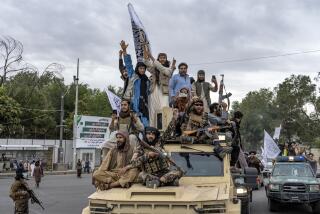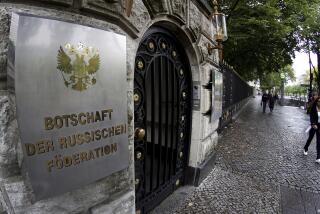‘All-Out’ Attack Urged by Some Allies--Reagan : European Ministers Agree on Crackdown
LUXEMBOURG — With even the hesitant Greeks now fully on board, foreign ministers of the European Communities agreed Monday on specific steps to be taken immediately to curtail the movement and activities of all Libyan nationals throughout the 12 member nations.
Meeting for the third time in eight days on the Libyan question, the ministers approved a series of recommendations drawn up by diplomatic and security experts from the 12 governments.
The recommendations were on how to implement a general policy declaration that the foreign ministers issued at a meeting in The Hague just hours before American warplanes took off from Britain for the air strike on Tripoli and Benghazi.
The ministers agreed to do the following:
--Trim their own diplomatic missions in Tripoli to a bare minimum and require the Libyans to reduce their European embassies, or “People’s Bureaus” as they call them, to the same size or less.
--Restrict Libyan diplomats to the capital to which they are assigned.
--Institute a strict review on all outstanding visas for Libyan nationals, and cut back on these. This action will affect businessmen, trade missions, airline and travel offices, commercial employees and students. Students will be required to renew visas frequently, on a basis of reports from school authorities.
--Bar any Libyan expelled from one of the member countries from entering any other member country.
--Curtail diplomatic privileges and immunities for the personnel of Libyan missions as circumstances warrant. This could mean tighter police action for such infractions as traffic offenses, for example, and the searching of diplomatic pouches moving to and from Tripoli.
The ministers agreed that it will be up to each government to determine exactly what cuts will be made in diplomatic missions in Tripoli, and what cuts to demand of the Libyan missions in Europe.
Italy Has Largest Mission
Italy has the largest Tripoli mission, believed to number about 50 people. Not only is the Italian community the largest foreign group in Libya, but the Italians also look after British interests in Tripoli since Britain broke off relations with Libya two years ago after someone inside the Libyan Embassy shot and killed a London policewoman.
In Bonn, the Libyan Embassy diplomatic staff already has been reduced to nine, and in Paris after the expulsion of four Libyans last week the number is down to nine also. There are 14 Libyan diplomats in Brussels, 20 in Madrid, 17 in Vienna, 7 in Copenhagen and 4 in Athens.
“We have proven that the community is determined to fight terrorism,” said West German Foreign Minister Hans-Dietrich Genscher. “Our actions are directed against Libya, but this is a warning to other states if they act in a similar manner.”
Dutch Foreign Minister Hans van den Broek, president of the communities, said the action “reflects the seriousness with which we want to address state terrorism.”
‘Substantial Step Forward’
British Foreign Secretary Geoffrey Howe commented:
“I think that the decision taken represents a substantial step forward and should go a long way to persuade the United States that the community means business in combating state terrorism.”
Howe noted that, since Britain broke off diplomatic relations with Libya two years ago, the Libyan student population in London is only one-tenth its former size.
As to the question of economic sanctions against Libya, Howe said that these could only work if everybody broke off trade completely, noting that even President Reagan “has had problems” with his order to all Americans to leave Libya. Between 1,000 and 1,500 Americans are believed to be still in the country, and some American firms have been given licenses to continue operating so that Libya cannot confiscate their property immediately.
Greece Falls Into Line
The Greek government, which has been the biggest foot-dragger in dealing with the Libyan problem in the last four months, fell into line this time without any blocking action. Last Monday in The Hague, the Greeks were reluctant even to name Libya in a statement condemning terrorism, and at one point wanted to name the United States equally for its naval activity off the Libyan coast.
This time around, ministers of the other member nations apparently convinced the Greeks that if they tried to water down concerted European action against Libya, it would only increase the likelihood of more unilateral military action by the United States.
On the diplomatic front, the Dutch government will formally notify the Libyan government on behalf of the communities of the actions being taken to restrict Libyan nationals and will warn that these measures now in place will be intensified if Libyan terrorist attacks against Europe continue.
The Dutch will also ask the Soviet Union and various Arab nations on behalf of the European Communities for cooperation in combatting terrorism.
More to Read
Sign up for Essential California
The most important California stories and recommendations in your inbox every morning.
You may occasionally receive promotional content from the Los Angeles Times.










